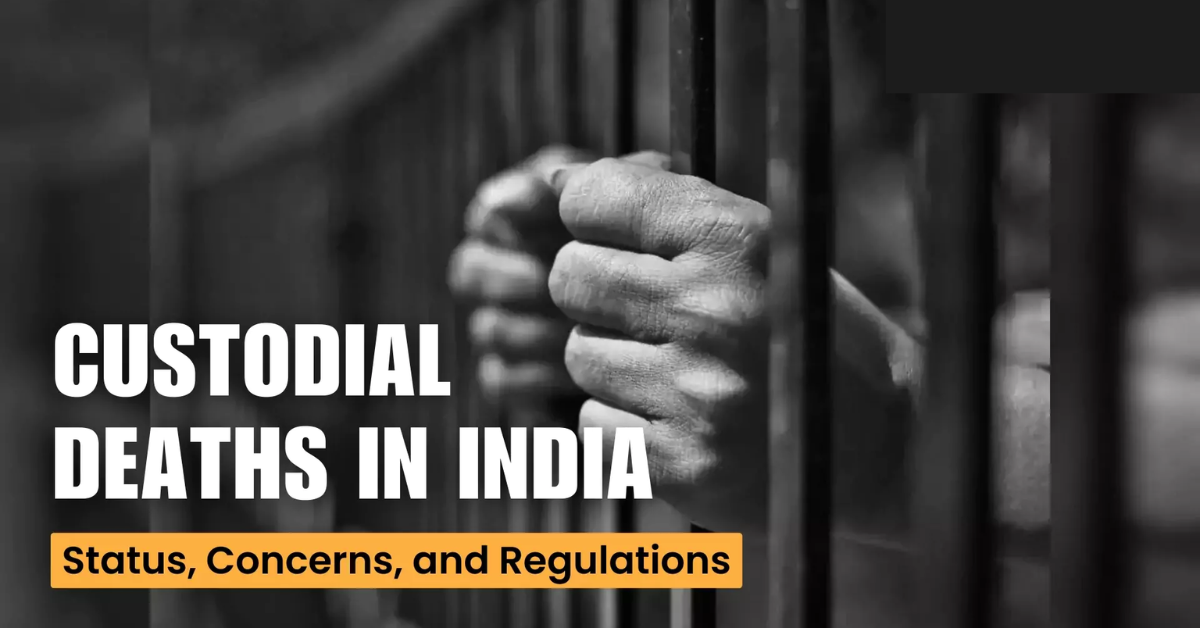Custodial deaths remain one of the most serious human rights violations in India, raising concerns about police brutality, abuse of power, and lack of accountability. Despite constitutional protections and legal safeguards, cases of torture and unnatural deaths in police and judicial custody continue to surface.
This blog explores the causes of custodial deaths, human rights violations, legal provisions, and remedies available to victims and their families in India.
Understanding Custodial Deaths
A custodial death refers to the death of an individual while in police custody, judicial custody, or detention centers. These deaths may occur due to:
- Police brutality and torture
- Medical negligence or lack of timely healthcare
- Suicide due to custodial pressure
- Fake encounters staged by law enforcement agencies
Types of Custodial Deaths
- Police Custody Death – Death occurring in lock-ups, interrogation rooms, or during police investigations.
- Judicial Custody Death – Death occurring inside prisons, jails, or under judicial supervision.
- Encounter Killings – Alleged deaths during police encounters, often suspected to be extrajudicial executions.
Causes and Factors Behind Custodial Deaths
Despite legal safeguards, custodial deaths continue due to:
- Torture and Physical Abuse
- Brutal treatment by law enforcement to extract confessions.
- Violations of human rights by using third-degree torture methods.
- Lack of Medical Attention
- Many detainees are denied timely medical aid, leading to deaths due to illness or injuries.
- Excessive Detention & Delay in Trials
- Prolonged detention without trials increases vulnerability to mistreatment and abuse.
- Fake Encounters
- Suspected criminals are killed in staged encounters to avoid judicial proceedings.
- Systemic Corruption and Police Impunity
- Low conviction rates and lack of strict punishment lead to continued misuse of power.
Legal Framework Against Custodial Deaths in India
India has several constitutional provisions, laws, and court rulings to prevent and address custodial deaths.
1. Constitutional Safeguards
- Article 21 (Right to Life & Liberty) – Protects individuals from unlawful detention and custodial torture.
- Article 22 (Protection Against Arbitrary Arrests) – Provides protection against arbitrary arrests and guarantees access to a legal defense.
2. Key Laws to Prevent Custodial Deaths
| Law/Provision | Description |
|---|---|
| Section 302 IPC | Punishment for murder in custody |
| Section 304 IPC | Deals with death caused by negligence |
| Section 330 & 331 IPC | Penalizes torture and wrongful confinement |
| Criminal Procedure Code (CrPC) Section 176 | Mandates judicial inquiry into custodial deaths |
| Section 41B CrPC | Guidelines on arrest procedures to prevent abuse |
| SC/ST Act, 1989 | Additional safeguards for Scheduled Castes & Scheduled Tribes facing police brutality |
3. Role of the National Human Rights Commission (NHRC)
- NHRC has the power to investigate custodial deaths and recommend action.
- Requires mandatory reporting of custodial deaths within 24 hours.
- Can issue compensation orders to victims’ families.
Supreme Court Guidelines on Custodial Deaths
The Supreme Court of India has issued several judgments to address custodial torture and deaths:
1. D.K. Basu vs. State of West Bengal (1997)
- Mandatory guidelines for arrest procedures, including:
- Right to legal representation.
- Medical examination of detainees every 48 hours.
- Mandatory police identification during arrests.
- Arrest memo signed by a family member or friend.
2. Prakash Singh vs. Union of India (2006)
- Recommended police reforms to prevent abuse of power and illegal detention.
3. People’s Union for Civil Liberties (PUCL) vs. Union of India (2014)
- Made it mandatory for all police stations to have CCTV cameras.
4. Extra-Judicial Execution Victim Families Association (EEVFAM) vs. Union of India (2016)
- Supreme Court ruled that fake encounters should be treated as cases of murder and must be investigated separately.
Legal Remedies for Victims of Custodial Deaths
Victims and their families have the right to seek justice and compensation through legal remedies:
1. Filing an FIR Against Police Officers
- Under Section 302 IPC, a case can be filed against police personnel involved in custodial deaths.
- Victims’ families can approach the magistrate if police refuse to register an FIR.
2. Compensation to Victims’ Families
- Courts often order financial compensation to the families of custodial death victims.
- NHRC also recommends monetary relief in cases of custodial violence.
3. Seeking Judicial Inquiry (Under Section 176 CrPC)
- Judicial inquiry is mandatory in all custodial deaths.
- Victims’ families can approach High Courts and the Supreme Court.
4. Public Interest Litigation (PIL) in Supreme Court
- Human rights activists and NGOs can file PILs against police brutality.
- Supreme Court can order independent investigations.
5. Human Rights Commission Complaint
- NHRC and State Human Rights Commissions (SHRCs) investigate custodial deaths.
- Victims’ families can lodge complaints directly with these bodies.
Steps to Prevent Custodial Deaths in India
- Strict Implementation of Laws & Guidelines – Enforce Supreme Court’s guidelines on arrest, detention, and custodial safety.
- CCTV Surveillance in Police Stations & Jails – Ensure all interrogation rooms are monitored to prevent abuse.
- Training & Accountability of Police Officers – Conduct human rights training for police personnel and introduce strict penalties for violations.
- Fast-Track Courts for Custodial Death Cases – Set up special courts to ensure speedy trials and punishment.
- Independent Investigations – Ensure all custodial death cases are investigated by an independent agency like CBI or NHRC.
Conclusion
Custodial deaths are a serious human rights violation that highlights the misuse of police power, lack of accountability, and failure of the criminal justice system. While India has laws and constitutional protections against custodial violence, their implementation remains weak.
Legal remedies, judicial intervention, and strong enforcement of human rights protections are crucial to prevent custodial deaths and ensure justice for victims and their families. Strengthening police reforms and public accountability is essential to uphold the rule of law in India.
Would you like to know more about human rights laws and legal protections in India? Let us know your thoughts in the comments! 🚔⚖️

